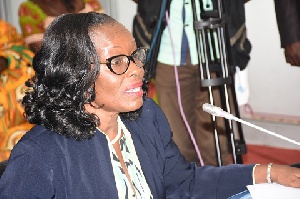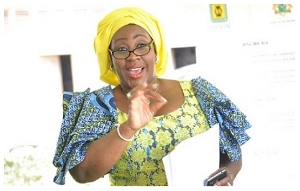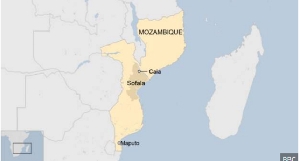General News of Friday, 27 October 2017
Source: dailyguideafrica.com
Minority rejects Special Prosecutor
Members of the minority National Democratic Congress (NDC) and the majority New Patriotic Party (NPP) in parliament fiercely clashed over the establishment of the Office of the Special Prosecutor when the second reading of the bill setting it up was taken in the house yesterday.
The minority members, led by Haruna Iddrisu, said even though they are not in principle against the Office of the Special Prosecutor Bill, 2017, they are strongly against the usurping of prosecutorial powers conferred on the Attorney-General by Article 88 (3) of the Constitution, by the new office and so they are ready to strongly resist that attempt.
According to the minority leader, if the Attorney-General is going to cede some of his or her prosecutorial powers to the Office of the Special Prosecutor – which will have the powers of an Appeals Court – then Article 88 (3) of the Constitution ought to be amended otherwise it would be unconstitutional to go ahead to pass the bill.
He further argued that it would be wrong for parliament to also pass an Act to amend Article 88 (3) because Article 289 (2) strongly objects to that.
“Mr Speaker, Article 289 (2) states that the 1992 Constitution shall not be amended by an Act of Parliament or altered whether directly or indirectly,” he said, adding that consideration and passage of the bill are an affront to the constitution.
“We are not against this bill because all of us agree that corruption is an enemy to development, but we will resist any amendment of this Constitution in relation to this bill through the backdoor,” Mr Haruna Iddrisu averred.
He proposed that bribery must also be made punishable by law, adding that if somebody can go to jail for stealing a goat or mobile phone, then the person who through an act of corruption dissipates the scarce resource of the country should also be prosecuted and jailed.
The ranking member of the Committee on Legal, Constitutional and Parliamentary Affairs, who is also the NDC MP for Tamale Central, Inusah Fuseini, expressed great concern over the independence of the Special Prosecutor, stressing that once the president will have a hand in the appointment of the Special Prosecutor, his or her independence could be compromised.
He said that the establishment of the Office of the Special Prosecutor is a political promise which is captured in the NPP’s manifesto and so there could be the propensity to use it to witch hunt political opponents.
The MP for Bawku Central, Mahama Ayariga, said that instead of creating the Office of the Special Prosecutor, it would be better to properly resource the existing anti-corruption agencies like Economic and Organised Crime Office (EOCO) and the Commission on Human Rights and Administrative Justice (CHRAJ), to fight corruption in the country.
Mr Mahama Ayariga said it is also not correct for the bill to take away the right of witnesses to remain silent when they appear before the Special Prosecutor, predicting that all cases that would appear before the Prosecutor might eventually end up at the Supreme Court for their judgement.
The majority NPP, led by its leader, Osei Kyei-Mensah-Bonsu, said that the minority members are opposed to the bill because they are scared of their past.
He said all Ghanaians, including the minority members, must applaud the Nana Akufo-Addo government for the boldness to introduce such an important bill that will be in existence to fight corruption in the society.
Mr Kyei-Mensah-Bonsu said it’s estimated that corruption alone costs the nation $3 billion a year and that for this government to be audacious to bring this office into being to fight the canker and save money for other development projects, it must be fully supported in that direction.
“Mr Speaker, object of the bill is clear and does not conflict with any constitutional requirement,” he said, adding that the independence of the Special Prosecutor had been taken care of in Clause 12 of the bill where a board would be constituted to coordinate the work of the Special Prosecutor without any political interference,” he said.











